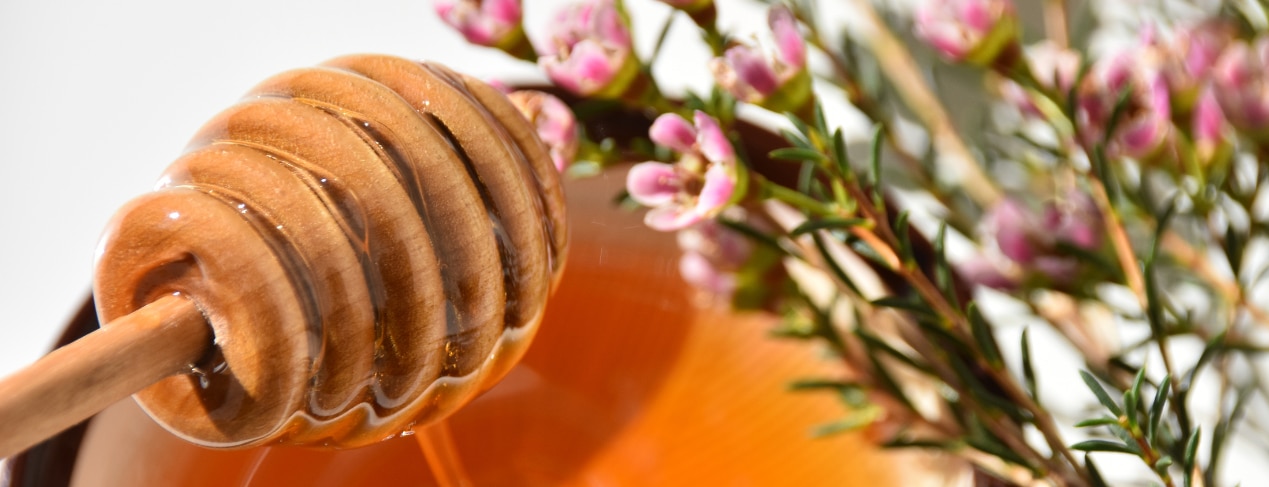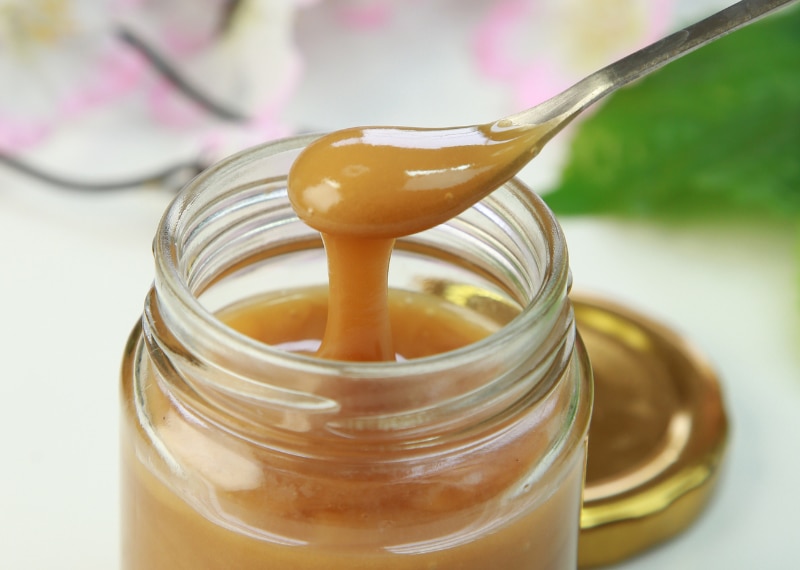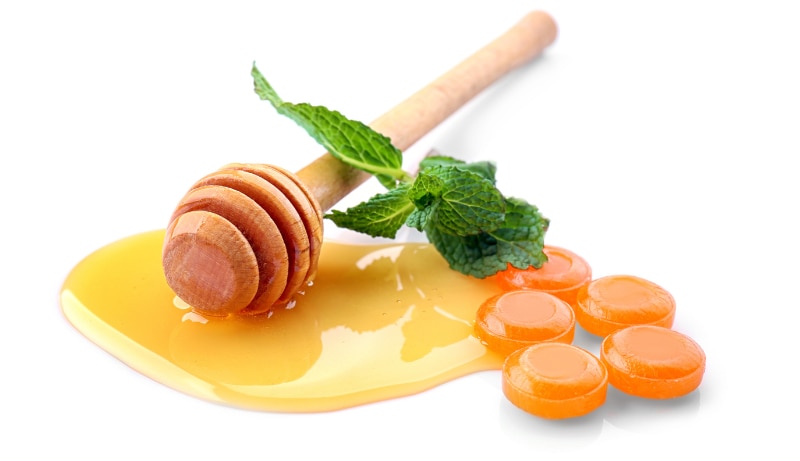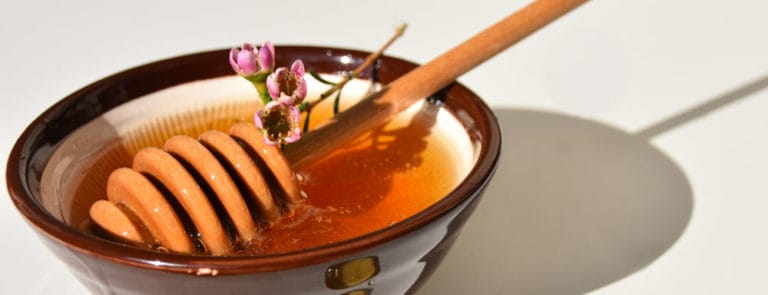10% off £35
Manuka Honey for your immune system: Colds, flu & sore throats

Most of us probably don't think about our immune system until we come down with a cold or flu-like bug.
When the colder weather comes in, you might start thinking about ways to give your immune system a helping hand to keep a cold at bay.
You might have already heard that taking Manuka honey, whether straight from the spoon or stirred into your morning cuppa, can benefit your well-being.
In this article, we'll walk you through some of the ways Manuka honey can help support your immune system, including helping with a cough or sore.
How could Manuka honey help your immune system?
How could Manuka honey help your immune system?
Want to keep the bugs at bay? Try Manuka Honey to support your immunity. Packed full of antibacterial properties, our entire range is 100% natural pure and certified, so we can help you stay well.
When it comes to superfoods, Manuka honey is up there with the best and is associated with many health benefits.
Raw honey has long been used as a soothing treatment since ancient times, from encouraging the skin to heal and easing a sore throat or cough, to soothing blemishes and sensitivity.
But we are only beginning to understand why Manuka honey is so special through scientific research.

What makes Manuka honey so unique?
Manuka honey comes from the nectar of flowers on the Manuka bush in New Zealand. The nectar from the flowers on the Manuka bush is what gives Manuka honey its beneficial effects and antibacterial properties as it contains methylglyoxal.
Methylglyoxal is a compound that gives Manuka honey its strong antibacterial properties. The amount of methylglyoxal is represented by an MGO rating - the higher the MGO rating, the higher the levels of methylglyoxal.
After processing with hydrogen peroxide, Manuka honey retains these properties, unlike other kinds of honey.
This means Manuka honey is packed full of antibacterial properties.
Research suggests that these properties of Manuka honey help support your body's respiratory and immune systems.1
A 2020 study showed encouraging results in understanding how Manuka honey can benefit the immune system.
The research found that Manuka honey increased the release of cytokines that are vital for keeping your immune system healthy. These cytokines help white blood cells find and stop infected or damaged tissues.2
Can Manuka honey help with allergies?
For those who find themselves struggling with hay fever or seasonal allergies, enjoying the good weather during the spring and summer can be tricky.
Sitting out in the sun or going for a nice walk can feel like the last thing you want to do if it results in a runny nose, itchy eyes, or a cough.
Whilst it is essential to check with your doctor so they can recommend the proper medication for your allergies, you may find that Manuka honey can help with your symptoms.

Allergies happen when your immune system produces antibodies known as immunoglobulin E (IgE).
These antibodies are meant to get rid of parasites in our bodies, but in modern times, these are less of a worry. Instead, the IgE antibodies can mistakenly recognise something harmless, like pollen, as a threat and will try to get rid of it from our bodies.
In doing so, cells in our bodies called mast cells release chemicals known as histamines. These histamines cause classic allergy symptoms like a rash or a cough.
Honey is a traditional remedy for allergy symptoms, particularly when it comes to hay fever.
Today, scientists believe that Manuka honey's antibacterial properties can help to soothe an allergic reaction.
In 2013, scientists conducting a study on the effects of Manuka honey and rhinitis (a form of hay fever) found that individuals who took Manuka honey alongside an allergy medication had their symptoms significantly improved than those who didn't.3
So, if you want to try honey for hay fever, why not make it Manuka and reap the antimicrobial benefits?
How to take manuka honey when you have a sore throat or a cough
How to take manuka honey when you have a sore throat or a cough
A recent study found that consuming Manuka honey lowered the level of Streptococcus mutans, the bacteria that causes a sore throat.4
Manuka honey has many uses and you can take Manuka honey for sore throats or coughs in different ways, from tea with Manuka honey to a handy Manuka honey lozenge.

Manuka honey drink
Taking Manuka honey this way means you get all the antibacterial properties and a sweet, soothing drink.
1
If you're looking for quick, effective relief from a sore throat or a cough, try stirring Manuka honey into water or tea.
2
All you need to do is mix a teaspoon of Manuka honey into your drink and stir.
3
For added flavour and even more benefits, try adding a slice of lemon or lemon juice too.
Manuka honey lozenges
If you want something to take on the go for a cough or sore throat, Manuka honey lozenges are a great option. These sweet, hard lozenges help to soothe and calm a sore throat.
Why not try the Manuka honey and lemon Comvita Manuka Honey with Propolis Lozenges for sore throat relief?

Can Manuka honey help with gastritis?
The antibacterial, antimicrobial, and anti-inflammatory properties of Manuka honey have been shown to be effective at easing stomach problems, even conditions like gastritis.
Gastritis is the inflammation of the stomach lining, most commonly caused by a bacteria called Helicobacter pylori or by damage to the stomach lining.
Studies have shown that Manuka honey has five ways that it can help with gastritis:
- It can deter the growth of Helicobacter pylori5
- It can protect your stomach lining6
- Its anti-inflammatory properties can help soothe the stomach7
- It can boost the immune system that can help regulate the effects of gastritis8
- It has wound healing properties
How to take manuka honey for gastritis?
There is no specific amount of Manuka honey to take, but generally, you should take no more than 20g per day.9
For best results, you can consume one teaspoon of Manuka honey daily 1-3 times between meals. It would help if you took it straight from the spoon or added water.
This works when taking Manuka honey for gastritis as well as Manuka honey for colds, or the flu.
When should you not take Manuka honey?
Whilst almost anything can cause an allergic reaction, honey is no exception.
Manuka honey is made by bees and may sometimes contain small amounts of pollen.
So, if you experience any allergic reaction symptoms when you eat honey or know you have a bee allergy, it's best to steer clear of Manuka honey.
Manuka honey also contains sugar. So, if you have high blood sugar, you should check with a doctor before consuming Manuka honey.
In summary
Manuka honey has a whole host of health benefits, and the potential to ease the symptoms of a cold, the flu or hay fever is a great bonus.
Bringing Manuka honey into your diet is a great way to support your immune system due to its antimicrobial, anti-inflammatory and antioxidant properties.
But, whilst taking Manuka honey for coughs, sore throats, and colds is easy, it is essential not to take too much due to its high sugar content. Furthermore, it is best to avoid Manuka honey entirely if you have an allergy to bees.
To find the best Manuka honey for your immune system, browse our collection of Manuka honey products today.

- https://www.ncbi.nlm.nih.gov/pmc/articles/PMC4837971/
- https://www.ncbi.nlm.nih.gov/pmc/articles/PMC7239342/
- https://pubmed.ncbi.nlm.nih.gov/24188941/
- https://pubmed.ncbi.nlm.nih.gov/10784339/
- https://pubmed.ncbi.nlm.nih.gov/25240315/
- https://pubmed.ncbi.nlm.nih.gov/26770649/
- https://pubmed.ncbi.nlm.nih.gov/22359278/
- https://pubmed.ncbi.nlm.nih.gov/22212104/
- https://pubmed.ncbi.nlm.nih.gov/20064284/
The advice in this article is for information only and should not replace medical care. Please check with your GP or healthcare professional before trying any supplements, treatments or remedies. Food supplements must not be used as a substitute for a varied and balanced diet and a healthy lifestyle.














